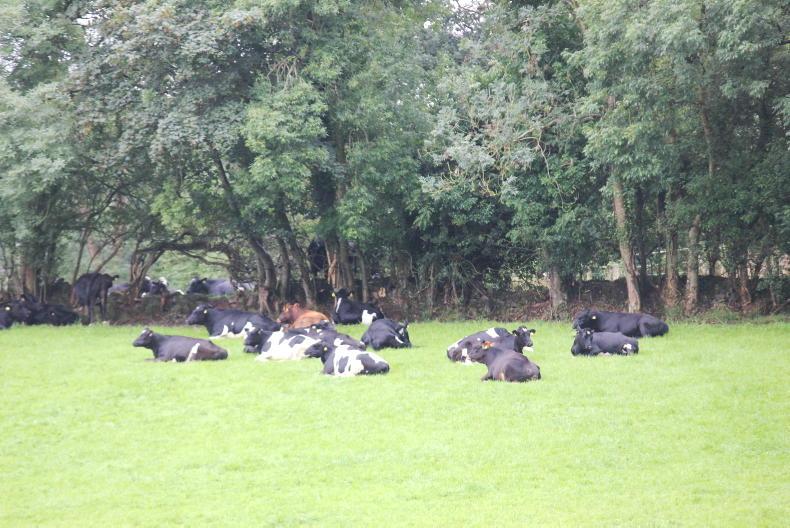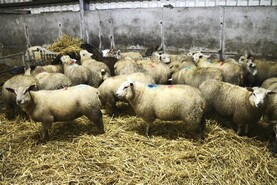If you flick on the television sometime between seven and nine o clock, chances are you will stumble upon another one of those farming programmes that seem to saturate the airwaves nowadays.
They must be popular with audiences, or else the explosion of options within this category would not have taken place.
I must admit that one or two of them tick my boxes, although others seem to portray most of us as bucolic simpletons, content as sheep in their rural paradise. Whether you’re a big fan, or consider them cringeworthy nonsense, at least they portray our industry in some sort of positive light.
Either way, there is an unmistakable take-home message floating around in the background, which shows a side of farming that viewers will envy and admire in equal measure.
It is this ‘aah look’ factor that sometimes makes me squirm, and yet I completely understand that it draws in the audiences.
And have you noticed how heavily reliant they are on anyone who is doing anything at all that could be deemed environmentally friendly?
Obviously, this must be a strong selling point too – large, intensive, go-ahead outfits can kiss goodbye to their chances of appearing on these shows.
Prime example
Despite tutting and eye-rolling my way through a lot of these programmes, I am not immune to the beneficial effects that certain words can have. A prime example is ‘organic’ (others are free-range, species-rich, non-GM, and pesticide-free), and I have recently been peppering my conversations with this word, just to see how people react.
A new crop of day-old chicks arrived at the beginning of August, and these are to be reared organically. Far from creating extra work for the rearer, organic birds are, if anything, less complicated to work with than standard birds. For instance, they aren’t allowed certain vaccines, or even vitamin supplementation in the water.
However, the biggest difference is the feed. With no GM soya or maize allowed, alternative ingredients have to be sourced and almost all of these have to be certified as organic.
Prairie meal is one that had me stumped, and I am informed that it is a high protein by-product of maize production. I am glad I don’t foot the bill for the meal, because it is somewhere in the region of double the price of standard concentrate.
Believe me, you can see the reaction in (non-farming) folks’ eyes when you casually mention that your birds are organic.
New Zealand
Much the same response is obtained when discussions come around to dairy heifer rearing. Because these are heading for a New Zealand system, you can drop in phrases like ‘hardly any meal’, ‘grass-fed’, ‘natural’ and ‘not forced’, while trying to maintain a serious and concerned facial expression.
I find it ironic that anything from New Zealand conjures up positive images, and yet anyone that has worked out there will tell you that individual animal welfare is not quite what we imagine. I suppose it’s another case of getting a reputation for rising early in the morning, then you can lie in bed all day.
I am not knocking the importance of portraying our industry in a way that is positive and constructive, but I do feel sad that we seem unable to get any sort of message across about healthy, cheap food.
Despite plenty of good news stories featuring eco-friendly farmers, there still needs to be a stronger platform for those thousands of producers who churn out affordable, nutritious, healthy food for lower-income families. Theirs is a real good news story that just doesn’t sell well.
Read more
Riding the farming rollercoaster
Issues with labour availability get real
If you flick on the television sometime between seven and nine o clock, chances are you will stumble upon another one of those farming programmes that seem to saturate the airwaves nowadays.
They must be popular with audiences, or else the explosion of options within this category would not have taken place.
I must admit that one or two of them tick my boxes, although others seem to portray most of us as bucolic simpletons, content as sheep in their rural paradise. Whether you’re a big fan, or consider them cringeworthy nonsense, at least they portray our industry in some sort of positive light.
Either way, there is an unmistakable take-home message floating around in the background, which shows a side of farming that viewers will envy and admire in equal measure.
It is this ‘aah look’ factor that sometimes makes me squirm, and yet I completely understand that it draws in the audiences.
And have you noticed how heavily reliant they are on anyone who is doing anything at all that could be deemed environmentally friendly?
Obviously, this must be a strong selling point too – large, intensive, go-ahead outfits can kiss goodbye to their chances of appearing on these shows.
Prime example
Despite tutting and eye-rolling my way through a lot of these programmes, I am not immune to the beneficial effects that certain words can have. A prime example is ‘organic’ (others are free-range, species-rich, non-GM, and pesticide-free), and I have recently been peppering my conversations with this word, just to see how people react.
A new crop of day-old chicks arrived at the beginning of August, and these are to be reared organically. Far from creating extra work for the rearer, organic birds are, if anything, less complicated to work with than standard birds. For instance, they aren’t allowed certain vaccines, or even vitamin supplementation in the water.
However, the biggest difference is the feed. With no GM soya or maize allowed, alternative ingredients have to be sourced and almost all of these have to be certified as organic.
Prairie meal is one that had me stumped, and I am informed that it is a high protein by-product of maize production. I am glad I don’t foot the bill for the meal, because it is somewhere in the region of double the price of standard concentrate.
Believe me, you can see the reaction in (non-farming) folks’ eyes when you casually mention that your birds are organic.
New Zealand
Much the same response is obtained when discussions come around to dairy heifer rearing. Because these are heading for a New Zealand system, you can drop in phrases like ‘hardly any meal’, ‘grass-fed’, ‘natural’ and ‘not forced’, while trying to maintain a serious and concerned facial expression.
I find it ironic that anything from New Zealand conjures up positive images, and yet anyone that has worked out there will tell you that individual animal welfare is not quite what we imagine. I suppose it’s another case of getting a reputation for rising early in the morning, then you can lie in bed all day.
I am not knocking the importance of portraying our industry in a way that is positive and constructive, but I do feel sad that we seem unable to get any sort of message across about healthy, cheap food.
Despite plenty of good news stories featuring eco-friendly farmers, there still needs to be a stronger platform for those thousands of producers who churn out affordable, nutritious, healthy food for lower-income families. Theirs is a real good news story that just doesn’t sell well.
Read more
Riding the farming rollercoaster
Issues with labour availability get real






 This is a subscriber-only article
This is a subscriber-only article










SHARING OPTIONS: